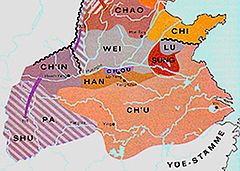Frank Diebel, Magister

Frank Diebel is sinologist and economist, historian and philosopher, he is married and has two daughters.
Since the turn of the year from 2014 to 2015, Frank lives in the beautiful Garden City of Chengdu, Home of the Giant Panda, Sichuan Province, People's Republic of China. He works there at the Southwestern University of Finance and Economics (SWUFE) in the International Office, at the Liberal Arts College, and at the College of International Education.
History of the Chengdu Plain until 316 BC
Since 2014, in his research Frank Diebel focusses on regional history of Sichuan. Here, in particular, he concentrates on ancient history from the early beginnings to the incorporation, or rather annexation, of the Chengdu Plain into the Kingdom of the Qin in 316 BC.
The famous Tang poet, Li Bai (701-762 AD), the son of a wealthy businessman who spent most of his childhood in Mianyang County, Sichuan Province, wrote in one of his poems that the Shu people lived here in the Sichuan basin for 48 thousand years in close isolation and with no contact to the outside world.
This type of native, poetic mystification of the Shu culture hasn't been uncommon ever since. For the moment one might be inclined to accept it due to a lack of first-hand written sources from the Shu people. Somewhat alike with the Celtic tribes in Europe in ancient times, for the most part we depend on third-party written documents, produced by descendants of conquerors, reporting about the life and customs of the Shu culture.
Archaeological discoveries of the past few decades might now help to unravel some mysteries about the Shu people who, according to current prevailing opinion, all of a sudden disappeared from the surface of the Sichuan basin after 316 BC, when the Qin people had conquered this region. The current sinological research project of Frank Diebel is dedicated to the search for truth behind some mysteries of the ancient Shu people.



